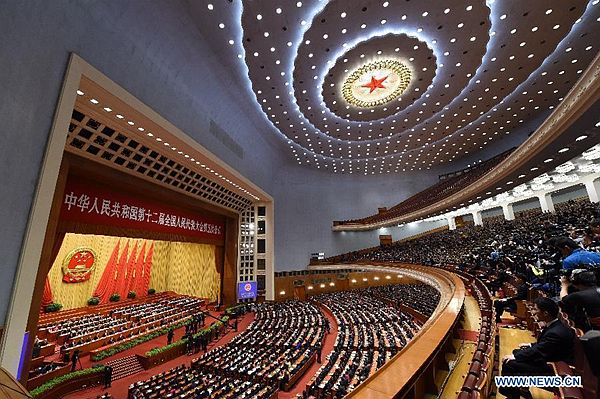China doubles down on global free trade
- By Tim Collard
 0 Comment(s)
0 Comment(s) Print
Print E-mail China.org.cn, March 15, 2017
E-mail China.org.cn, March 15, 2017
|
|
|
The closing meeting of the fifth session of the 12th National People's Congress is held at the Great Hall of the People in Beijing, capital of China, March 15, 2017. (Xinhua/Yang Zongyou) |
As always at this time of year, the eyes of the world are on China as the country conducts the annual "two sessions" event, combining the annual conferences of the NPC and CPPCC, and providing a platform for the top leadership to issue a policy programme for the year to come. In every fifth year, including this one, the "two sessions" acquires increasing importance in the run-up to the autumn congress of the ruling Communist Party.
As regards to China's approach to the rest of the world, the hallmark of President Xi's tenure of office has been a commitment to opening up China's trade relations with the outside world and, indeed, to taking proactive measures to improve the infrastructure for global trade.
President Xi emphasized this commitment in front of the world's leading economic players in his speech at the World Economic Forum in Davos in January, saying that a policy of protectionism is the equivalent of "locking oneself in a dark room." Following such a clear and public declaration of purpose, it was hardly surprising that the messages coming from the NPC redoubled this commitment.
Premier Li Keqiang, in his presentation of the government's work report, took up the message that the core leader had given in Davos: That China is prepared to dig in for the long term on her free-trade policy and not to be blown off course by outside influences (such as the uncertainties of U.S. policy under the new Trump administration). The pursuit of global free trade was linked explicitly to China's "reform and opening up" policy, a central plank of CPC doctrine for the last forty years.
The reiteration of this commitment also gave two other signals to the world, presumably deliberately. Firstly, it indicates China's great confidence in her position in the modern world. Free trade brings risks, but the leadership clearly believes that China can face them and come through triumphant. It also signals that China will not shy away from the responsibilities which come with her enhanced - and, in some senses, dominant - role in the management of global problems and challenges.
Indeed, the willingness to accept this responsibility has been clearly shown by the progress of the Belt and Road programme, actively building and reinforcing new platforms and infrastructure to underpin mutually beneficial trading growth. China is not just talking.
The reports issued from the conference did not contain overt criticism of President Trump and recent U.S. policy, but comments by NPC deputy Ou Chengzhong such as, "at a time when isolationism and protectionism are on the rise in the West, China's openness will be the benchmark for continued globalization," indicate that China is resolutely opposed to certain tendencies which have, indeed, been emerging from political turmoil in the Western world.
The details of the planned developments will emerge in due course, but the general guidelines have been laid down, including improving the foreign investment environment by opening up service industries, manufacturing, and mining to foreign investment, and allowing foreign companies to take part in national science and technology projects.
Stock exchange listings and the issuing of bonds are also to be made easier for foreign-invested companies. The flagship programme of President Xi's administration, the Belt and Road Initiative, will continue to lay the groundwork for improving China's trade with countries which have hitherto been less accessible to global markets. This will be achieved by establishing the hard infrastructure for overland economic corridors and maritime cooperation hubs.
A further encouragement to foreign trade with China came with assurances that intellectual property rights (IPR) issues in China were being properly addressed. In the days when China was primarily seen as a low-cost manufacturing base, dissensions over IPR were a major obstacle to trade. Now that China has its own innovative economy to protect, the establishment of effective courts to judge on such issues is a very positive move, affording protection to both domestic innovators and foreign suppliers of high-end technology. This is an example of the kind of win-win situation given prominence in Premier Li's work report.
If there had been any doubt about the future of China's globalization policy, now it would have been the time to express caveats and manage expectations downwards. But the leadership has not taken that route, opting to "double down" on the policies which have characterized the current leadership right from the start. Forty years ago it would have been difficult to envisage China operating in the role of flag-bearer for global free trade. But this commitment is evidence of the complete transformation of China and the success of her consistent policy of "reform and opening up."
Tim Collard is a columnist with China.org.cn. For more information please visit:
http://www.china.org.cn/opinion/timcollard.htm
Opinion articles reflect the views of their authors, not necessarily those of China.org.cn.







Go to Forum >>0 Comment(s)